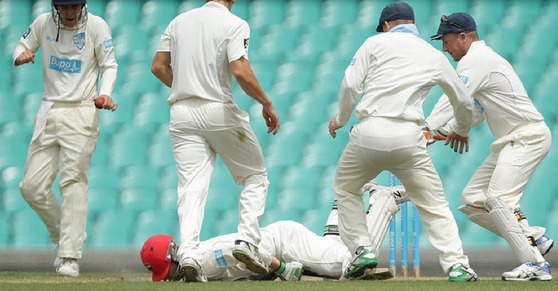Phil Hughes, a talented Australian cricket batsman, died on Thursday, two days after a ball hit Hughes in the head and caused a cerebral hemorrhage.

Hughes was 25. His 26th birthday would have been on Sunday.
“Phillip Hughes was a young man living out his dreams,” Australian Prime Minister Tony Abbott said in a statement. “His death is a very sad day for cricket and a heartbreaking day for his family.”
“What happened has touched millions of Australians.”
Hughes on Tuesday was playing a state match for South Australia against New South Wales. As Hughes was up to bat, he was hit by a “bouncer” — a cricket pitch that’s deliberately thrown short, so the ball bounces high toward a player’s head. (In baseball, think of a pitch that’s thrown inside the plate.)
Bouncers are intended to be difficult to hit and can be thrown to intimidate a batsman.
While cricket players wear helmets, Hughes was struck at the base of his neck, where he was exposed. It’s an unusual injury and required Hughes to be turning his head at the exact moment he was struck.
One expert estimated that the ball was traveling about 85 km/hour, or roughly 53 miles/hour, when it hit Hughes. A cricket ball weighs about 160 grams, or about one-third of a pound. It’s a bit smaller but heavier — and harder — than a baseball.
“Biomechanical experts say the impact is similar to being hit by a bullet,” according to a graphic in News.com.au.
Medical staff tried life-saving measures at the scene before Hughes was taken to St. Vincent’s Hospital, about one mile away, to undergo neurosurgery. However, Hughes never woke up from his induced coma.
Hughes’ death has rattled Australia and the sport of cricket. There’s been some debate over whether the “bouncer” should be banned, and if new helmets would’ve saved Hughes’ life. But the arguments in cricket are pretty similar to safety arguments in baseball and football: That those changes would change the sport too dramatically.
“If you take away [the bouncer] from the game it takes away that combative nature of cricket,” said Matthew Hayden, a retired Australian cricketer. And a helmet that would’ve protected Hughes’ neck would’ve restricted his ability to move and dodge pitches.
Hughes’ passing is also a sad reminder of what U.S. sports leagues are desperate to avoid: The tragic image of a player dying on the field. Major League Baseball officials continue to seek a way to protect pitchers from the possibility of a cerebral hemorrhage, without requiring them to wear full headgear or pitch from behind a screen.
After being hit, Hughes briefly put his hands on his knees, before pitching forward face-first and losing consciousness.





